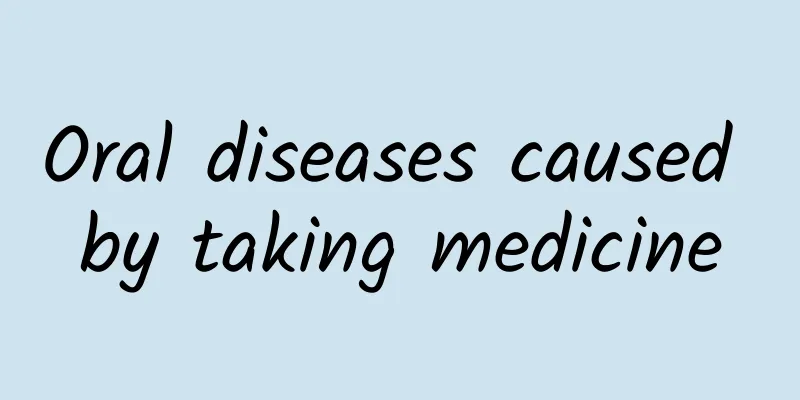Oral diseases caused by taking medicine

|
What is medicine? It is used to treat diseases! But sometimes, medicine can cause diseases! Some oral diseases are caused by taking medicine. The most familiar drug-induced oral disease is probably tetracycline tooth that was popular many years ago. But in fact, there are more than one oral disease caused by taking medicine. So today we will talk about those oral diseases related to medicines. 1. Acid erosion Erosion is a type of tooth wear (TW). It is defined as the irreversible loss of tooth structure due to chemical dissolution initiated by acids of non-bacterial origin . The most common cause of erosion is exposure of teeth to acidic foods such as alcohol, juices, carbonated beverages, etc. Similarly, many acidic drugs, such as chewable vitamin C tablets, aspirin and some iron preparations, may also cause erosion. In addition, certain medications that cause hyposalivation (low saliva quantity or quality) are also considered risk factors for erosion because these medications weaken the buffering effect of saliva on the oral environment and thus weaken the protective effect of saliva on teeth. Of course, the direct consequence of insufficient saliva secretion is dry mouth, which can lead to a series of oral health problems, including but not limited to erosion, tooth decay, bad breath, oral candidiasis, burning mouth syndrome, etc.
2Drug -induced gingival hypertrophy Not only teeth can be affected by drugs, but other oral tissues and organs may also be affected by drugs. The gums are a typical example, and the gum disease caused by drugs is called drug-induced gingival enlargement (DIGE) .
The three commonly used drugs related to DIGE are: ① anti-epileptic drugs - phenytoin sodium; ② immunosuppressants - cyclosporine, which are often used in patients with organ transplants or certain autoimmune diseases; ③ calcium channel blockers , such as nifedipine and verapamil, which are mainly used to treat cardiovascular diseases. Therefore, once patients using the above-mentioned drugs are found to have gingival hypertrophy, it is recommended that on the one hand, good oral hygiene measures be taken to try to remove local irritants that cause gingival inflammation; on the other hand, consider discontinuing the above-mentioned drugs or replacing them with other drugs. As mentioned before, there are many more oral diseases caused by drugs than these, which will be discussed later! |
<<: The child is actually asking you for help when he/she makes faces and acts naughty.
Recommend
Why is a woman bleeding dark red blood after not having sex for a long time?
Women who are having sex for the first time may f...
What is the disease of watery green leucorrhea
If the leucorrhea is watery and green, then women...
How to treat oral ulcers in pregnant women?
How to treat oral ulcers in pregnant women has al...
What should I do if there is blood in my menstrual period?
Some women have problems with their menstruation,...
What kind of worms are coming out of the cat's butt? What should I do if there are white strips on the cat's butt?
Cats are pets kept by many people. Generally, cat...
What is false labor?
False labor is a phenomenon that many pregnant wo...
Will low blood pressure affect menstruation?
Compared with men, women are more likely to suffe...
Can I eat duck meat during menstruation?
We all know the importance of diet to us. A good ...
Latest report! China CDC: Influenza virus positive rate is still rising
On March 18, the Chinese Center for Disease Contr...
The true legend behind the fame of saffron
This is the 2916th article of Da Yi Xiao Hu In re...
Is Mirena good for treating adenomyosis?
Adenomyosis is a common gynecological disease. Th...
Is vulvar leukoplakia a gynecological disease or a skin disease?
Vulvar leukoplakia, from the literal meaning, we ...
Female reproductive anatomy
The functions of the female vagina are the reprod...
Effects of pangolin powder on women
Pangolin is a very precious mammal. It likes to b...
Should nails be cut into round or square shapes? How short should they be cut? I didn’t expect there are so many things to know about nail cutting
Cut your nails Different people have different cu...









